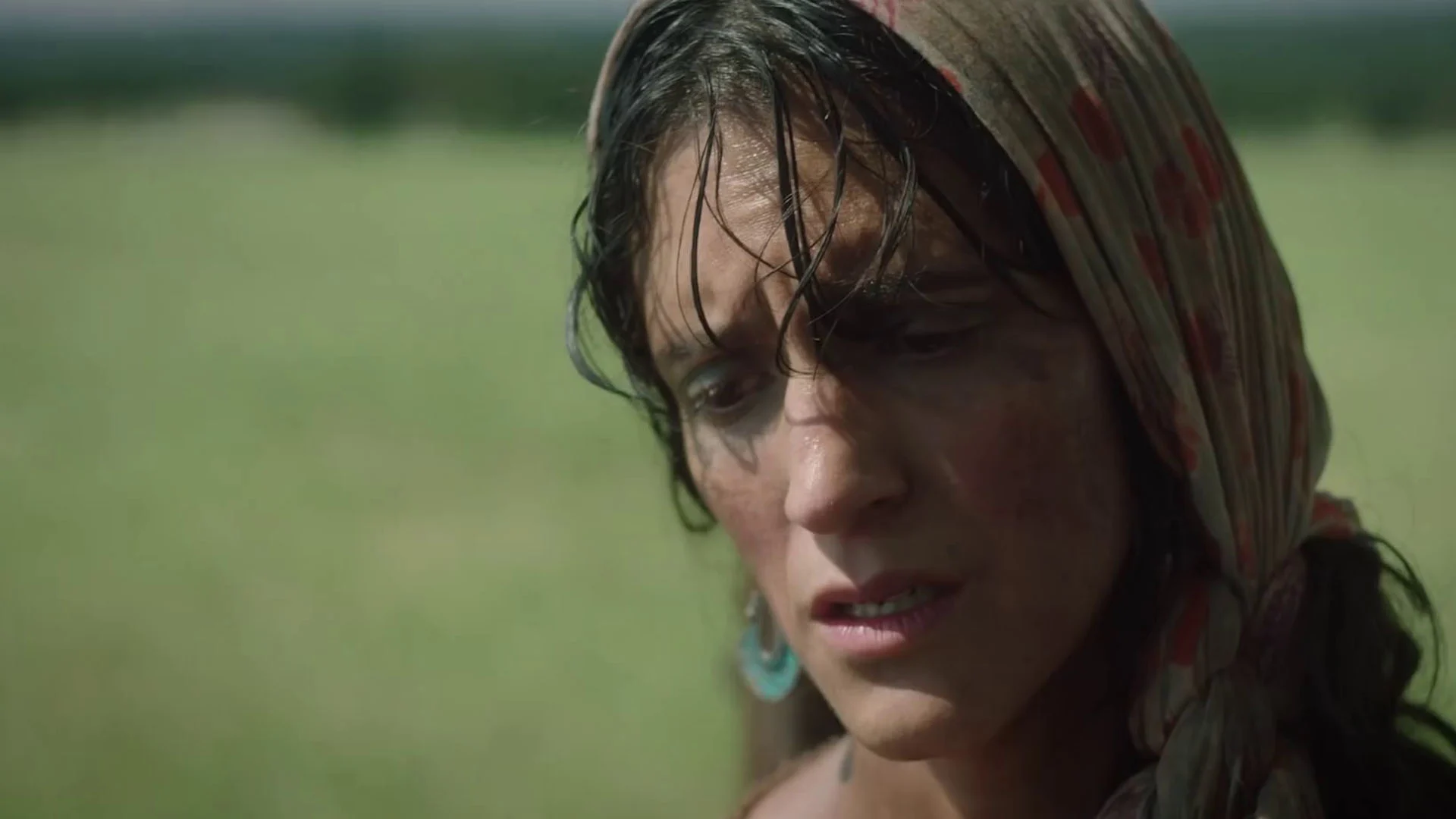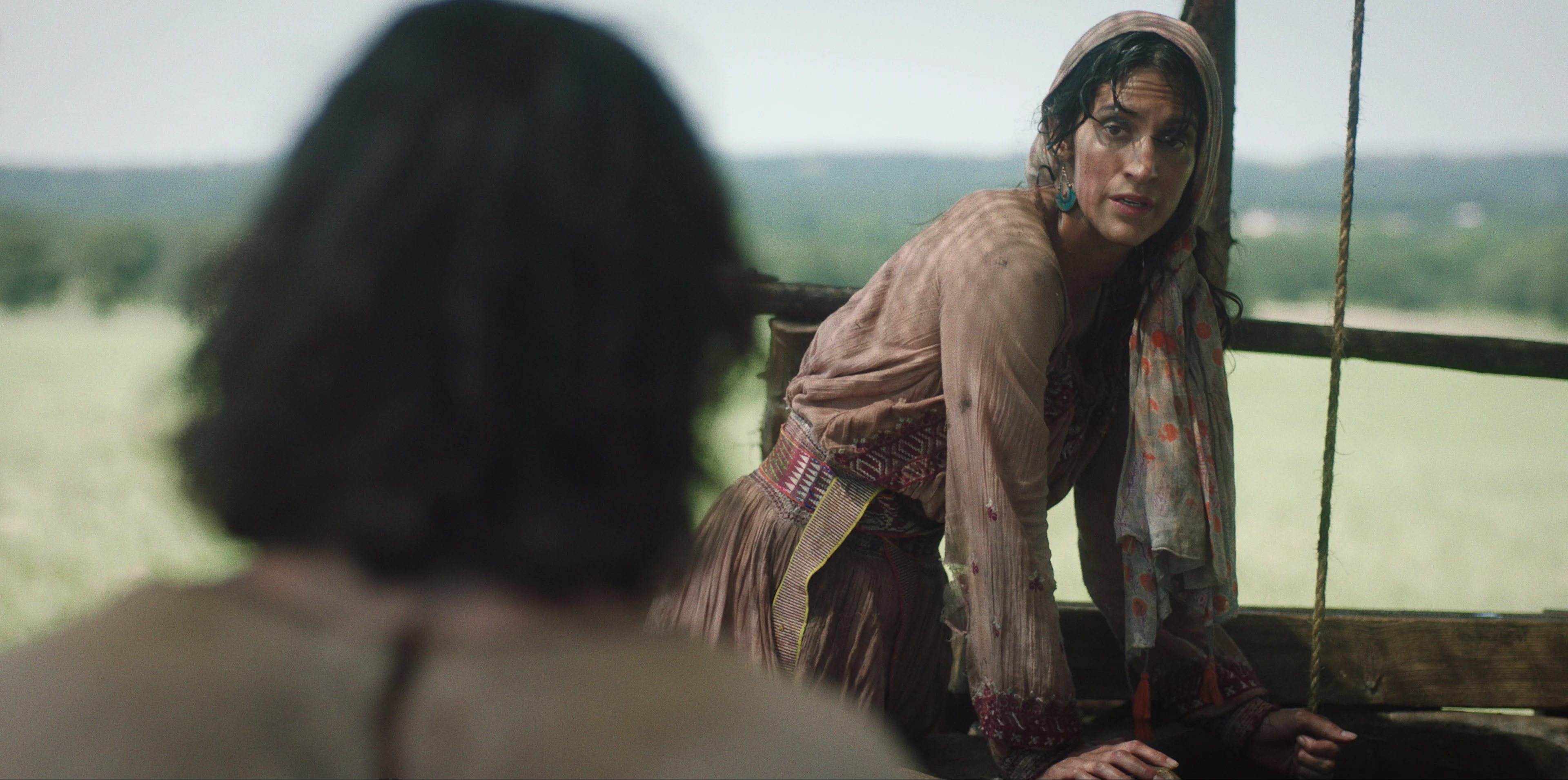Samaritan Woman at the Well
The Chosen Season 1 ends in a powerful biblical moment: Jesus declaring Himself as the Messiah to the Samaritan woman at the well. This New Testament account is one that can be easy to overlook. Compared to the iconic, world-changing miracles of healing the blind and raising the dead, a simple theological discussion between two people of different cultural backgrounds may seem decidedly mundane. But within this narrative, Jesus touches on certain essential gospel truths. In so doing, He alludes to a miracle even greater than the one performed on Lazarus.
Jesus and the Samaritan Woman at the Well: Bible Story

The story of Jesus and the Samaritan woman is found in the fourth chapter of the Gospel of John.
4 Now he [Jesus] had to go through Samaria.
5 So he came to a town in Samaria called Sychar, near the plot of ground Jacob had given to his son Joseph.
6 Jacob’s well was there, and Jesus, tired as he was from the journey, sat down by the well. It was about noon.
7 When a Samaritan woman came to draw water, Jesus said to her, “Will you give me a drink?”
8 (His disciples had gone into the town to buy food.)
9 The Samaritan woman said to him, “You are a Jew and I am a Samaritan woman. How can you ask me for a drink?” (For Jews do not associate with Samaritans)
10 Jesus answered her, “If you knew the gift of God and who it is that asks you for a drink, you would have asked him and he would have given you living water.”
11 “Sir,” the woman said, “you have nothing to draw with and the well is deep. Where can you get this living water?
12 Are you greater than our father Jacob, who gave us the well and drank from it himself, as did also his sons and his livestock?”
13 Jesus answered, “Everyone who drinks this water will be thirsty again,
14 but whoever drinks the water I give them will never thirst. Indeed, the water I give them will become in them a spring of water welling up to eternal life.”
15 The woman said to him, “Sir, give me this water so that I won’t get thirsty and have to keep coming here to draw water.”
16 He told her, “Go, call your husband and come back.”
17 “I have no husband,” she replied. Jesus said to her, “You are right when you say you have no husband.
18 The fact is, you have had five husbands, and the man you now have is not your husband. What you have just said is quite true.”
19 “Sir,” the woman said, “I can see that you are a prophet.
20 Our ancestors worshiped on this mountain, but you Jews claim that the place where we must worship is in Jerusalem.”
21 “Woman,” Jesus replied, “believe me, a time is coming when you will worship the Father neither on this mountain nor in Jerusalem.
22 You Samaritans worship what you do not know; we worship what we do know, for salvation is from the Jews.
23 Yet a time is coming and has now come when the true worshipers will worship the Father in the Spirit and in truth, for they are the kind of worshipers the Father seeks.
24 God is spirit, and his worshipers must worship in the Spirit and in truth.”
25 The woman said, “I know that Messiah” (called Christ) “is coming. When he comes, he will explain everything to us.”
26 Then Jesus declared, “I, the one speaking to you—I am he.”
27 Just then his disciples returned and were surprised to find him talking with a woman. But no one asked, “What do you want?” or “Why are you talking with her?”
28 Then, leaving her water jar, the woman went back to the town and said to the people,
29 “Come, see a man who told me everything I ever did. Could this be the Messiah?”
30 They came out of the town and made their way toward him.
31 Meanwhile his disciples urged him, “Rabbi, eat something.”
32 But he said to them, “I have food to eat that you know nothing about.”
33 Then his disciples said to each other, “Could someone have brought him food?”
34 “My food,” said Jesus, “is to do the will of him who sent me and to finish his work.
35 Don’t you have a saying, ‘It’s still four months until harvest’? I tell you, open your eyes and look at the fields! They are ripe for harvest.
36 Even now the one who reaps draws a wage and harvests a crop for eternal life, so that the sower and the reaper may be glad together.
37 Thus the saying ‘One sows and another reaps’ is true.
38 I sent you to reap what you have not worked for. Others have done the hard work, and you have reaped the benefits of their labor.”
39 Many of the Samaritans from that town believed in him because of the woman’s testimony, “He told me everything I ever did.”
40 So when the Samaritans came to him, they urged him to stay with them, and he stayed two days.
41 And because of his words many more became believers.
42 They said to the woman, “We no longer believe just because of what you said; now we have heard for ourselves, and we know that this man really is the Savior of the world.”
Click here to watch The Chosen depicting this event.
Jesus' mortal ministry was confined to a relatively small area—only a tiny corner of what would eventually come to be known as the Middle East. But within that area were many different cultures and peoples. Two such groups were the people of the Tribe of Judah (the Jews, which included Jesus and most of his disciples) and the Samaritans.
As demonstrated in Jesus’ well-known parable of the good Samaritan, these two groups seldom interacted. There was an almost universally-accepted animosity between Jews and Samaritans, and any Jew seen talking with a Samaritan would risk being looked down on or even ostracized by his or her peers. Despite this, when Jesus saw the Samaritan woman approach the well, he ignored the stigma and engaged her in conversation.
Jesus Teaches with Love, not Judgment
Just as Jesus could easily see that the woman by the well was a Samaritan, she knew upon first meeting that Jesus was a Jew. So when he spoke and asked her for a drink (she was already in the process of drawing water, and Jesus had no jar to use in fetching water for himself), her response was one of incredulity.
It quickly became apparent to the woman that Jesus was not interested in perpetuating the enmity that had divided their two peoples. But even more than that, Jesus showed true compassion. As their conversation progressed, it became just as clear that Jesus’ love is available to everyone, regardless of gender, nationality, or past mistakes. Through prophetic insight, Jesus perceived that the Samaritan woman at the well had been married five times, and that she was currently living with a man who was not her husband.
Whatever modern sensibilities may say about her situation, there is no denying that her choices would have made her an outcast among even her own people. In that area, it was much more common for women to come to the well in the cooler hours of the morning, but she encountered the Jesus at the well in the heat of midday. It can be inferred that she was going to the well in the middle of the day to avoid seeing other who might insult her, or that other women in the area simply would not allow her to join them at the well in the morning.
Jesus demonstrated His divine ability by addressing the realities of the woman’s life, issues that He could never have known about on His own. But as He did so, it was completely without judgment. He spoke to the Samaritan woman at the well and addressed her as a person to be guided, not as a sinner to be condemned. And He treated her as an equal.
Jesus turned this apparently random encounter into an opportunity to demonstrate the nature of heaven and the power of forgiveness. He taught her about His mission to redeem humanity, and openly revealed Himself as the Messiah. And then, He allowed her to take a role in that mission by sharing the message with others.
The Water of Eternal Life
The story of the Samaritan woman at the well teaches the importance of compassion and acceptance, but it also provides insight into how to be more teachable.
Jesus used the relatable experience of fetching water to segue into a discussion about the power of salvation. And rather than simply taking his words at face value, the Samaritan woman at the well demonstrated commendable teachability. She not only listened; she listened actively. She asked questions to help her develop a deeper understanding. And then she acted on her newfound knowledge.
The woman’s open mind and self-honesty made her an ideal student.
If you haven’t already, check out Angel Studios’ The Chosen to view the first-ever multi-season show about the life of Jesus. This historical drama set in Judaea and Galilee in the first century CE follows Jesus and those whom He met and ministered to.
Download the Angel app on Google Play or the App store and start watching today.





